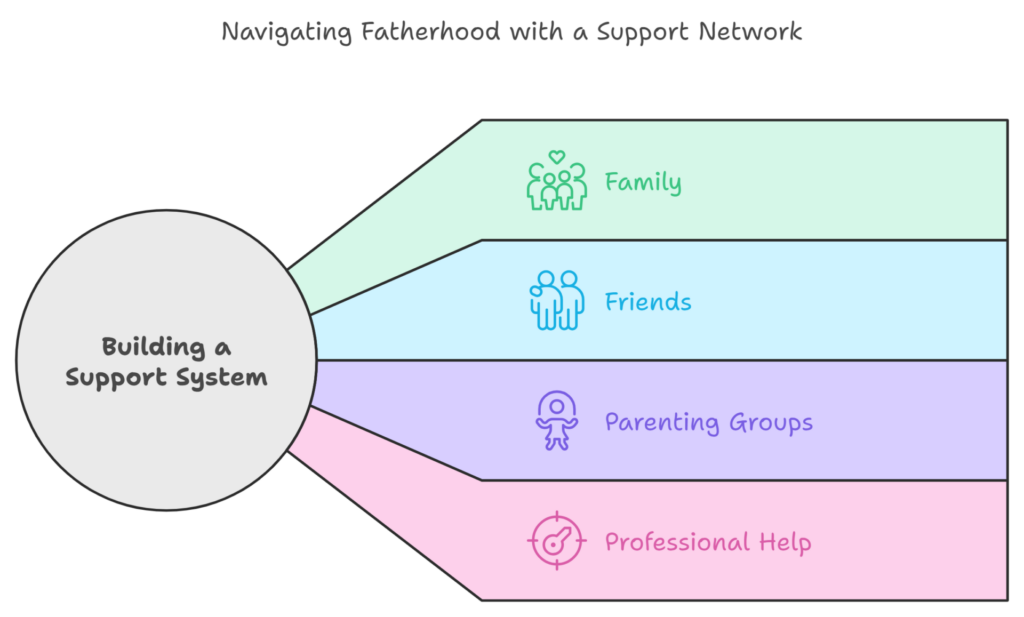How to Prepare for Fatherhood: Tips from a Parenting Coach

Finding out that you’re going to be a dad can change your life, especially if it’s your first time. Preparing for fatherhood is a journey that requires both emotional and mental readiness.
Maybe you were sitting in the doctor’s office, or perhaps you were at home when your partner shared the news. You might have felt a mix of excitement and fear, which is completely normal.
You might remember the exact moment you found out. Maybe you were excited, or maybe you felt scared as the reality of fatherhood sank in.
These mixed feelings are completely normal. Becoming a dad is one of the most rewarding and challenging journeys you’ll ever go on. The anticipation brings excitement, but it can also bring doubts and fears.
This is especially true when it comes to feeling prepared to take on the responsibilities of fatherhood. For many, this big life change brings a sense of responsibility that can be overwhelming.
That’s why preparing isn’t just about buying diapers—it’s about getting ready mentally and emotionally, too.
These feelings can be overwhelming, but you’re not alone. It’s very normal for new dads to feel anxious and unsure. Research shows that mental health and well-being during the transition to fatherhood are often not talked about enough.
This is important because a father’s mental health affects his ability to be supportive and impacts the entire family’s well-being. When fathers struggle mentally, it can create stress for the whole household, affecting relationships and overall stability.
This makes it harder for new dads to get the support they need. A dad’s mental health affects his ability to support his partner and the overall mood of the family. You may never feel completely “ready” for fatherhood.
However, you can take steps to prepare mentally and emotionally. Do your research. Stay involved in the pregnancy. Decide what kind of dad you want to be. These actions can help you feel more prepared.
You might be a dad-to-be who loves to plan. Or maybe you are unsure where to start. You could also be a partner wanting to help. This guide will walk you through practical steps. It will help you get ready for fatherhood.
By following these tips, you’ll be better prepared to take on your new role. Approach it with an open heart, a clear mind, and confidence.

1. Do Your Research
You’ve probably already Googled “how to change a diaper” or “how to soothe a newborn,” and that’s a great start. But mentally getting ready for fatherhood means going beyond the basics. Take the time to learn about the milestones your baby will reach.
These include their first smile, learning to sit up, or taking their first steps. Knowing these milestones helps you bond with your baby and sets realistic expectations for their growth.
Also, learn about the physical and emotional challenges your partner might face. Knowledge is power, and the more you know, the less scary this new chapter will feel.
You may prefer reading books, listening to podcasts, or watching videos. Asking experts or taking classes are other options. There’s a lot of helpful information out there for expecting parents.
Knowing the stages of development can help you feel more connected to your baby even before they’re born. Understanding the basics makes the unknown easier to handle.
Research shows many new dads need more support during this time.
They require emotional support, practical advice, and reliable information about what to expect. Learning about baby development can help you feel more prepared.
Understanding emotional changes in your partner is also beneficial. Exploring different parenting styles can reduce anxiety.
Research these areas to help put your mind at ease:
Remember, no amount of research can prepare you for every moment. But the more you know, the better prepared you’ll be for surprises.
2. Prepare for Fatherhood by Being Involved in the Pregnancy
Fatherhood starts long before your baby is born. Being involved in your partner’s pregnancy is essential. It helps you build a strong connection with your child. It also supports your partner.
Confirming the pregnancy, seeing the baby on an ultrasound, and hearing the heartbeat are big milestones. Being involved can help you enjoy this time, connect with your partner, and support them through the process.
Research shows that many new dads want more support during pregnancy. Being involved can help ease some of the fears and anxieties that come with the unknowns of fatherhood.
How to Be Involved During the Pregnancy
Being involved doesn’t just help you bond early on; it also shows your partner that they’re not alone. For example, attending prenatal classes together can lower their stress. It helps to know that you’re both committed to getting ready for the baby’s arrival.
3. Accept That Life Will Change
It’s no secret that having a baby will change your life. The sooner you accept that life will be different, the easier the transition will be. Your daily routine, social life, and even your relationship will change.
Think about:
Parenting is a full-time responsibility that is very different from any role you’ve had before. Unlike other jobs or roles, parenting requires constant attention. For example, a baby needs you day and night. There are no breaks or set hours as in other responsibilities.
This shift can affect your sense of identity. It alters your priorities. You must adapt to new demands. It’s crucial to find a balance between being a parent and keeping other parts of your life. So far, your own needs have been the focus.
But that will change, as you’ll be responsible for a baby who depends on you for everything.
Research has shown that the challenges of new fatherhood can lead to stress and negative emotions. Accepting that life will change is important. Finding ways to adapt can help reduce some of the stress from these new demands.
Adjusting to these changes isn’t easy and may take time. It can help to write down your thoughts and fears in a journal. You can talk with loved ones. They can share how they managed and balanced parenting with other aspects of life. You can also speak to other parents for advice.

4. Reflect on Your Childhood
Your upbringing has a big impact on how you parent. Take time to reflect on your childhood, both the good and bad parts. What did your parents do that made you feel loved? What would you want to do differently?
Reflecting on this will help you figure out the values you want to keep. It will also help you identify the values you want to change.
Thinking about your upbringing can help you make more conscious choices about the kind of parent you want to be.
5. Picture What Kind of Father You Want to Be
Imagining the kind of father you want to be is a powerful exercise. Do you want to be a dad who’s always there? Someone who encourages creativity? Visualizing your role can help you set intentions and identify what actions you need to take.
Picture different scenarios like holding your baby for the first time, hearing their laughter, or handling sleepless nights. This can help you feel more ready for the role.
6. Don’t Feel Pressured by Gender Roles
Society often puts pressure on dads to be the “provider” while moms are expected to be the main caregivers. These stereotypes can make it harder for dads to be fully involved.
Research has found that many new dads struggle with the pressures of traditional gender roles, which can affect their well-being. Dads wanted more freedom to redefine their roles.
Being a father is about sharing all of your qualities, not just earning a living. Dads can be protectors, nurturers, teachers, and more. It’s okay to do things your way.
7. Parenting Isn’t Easy, and It’s OK Not to Be OK
There’s no such thing as a perfect parent, and that’s okay. You will make mistakes—everyone does. Accepting this will help you handle challenges better.
Research shows that new dads often feel stress and fear, especially during the first year of parenting. A lack of support from healthcare professionals can make these feelings worse.
Keep your expectations realistic and remember to care for your mental and physical health.
You’re not alone. Every new dad has moments of doubt, but reaching out for support can make a big difference.

8. Build Your Support System
No one can do this alone. Building a support system is key to your mental and emotional health. Surround yourself with people who can guide you, listen to you, or just be there.
New dads often want more guidance and support. They especially need help with getting ready for fatherhood. Additionally, they seek advice on navigating relationship changes. Building your support network early on can give you reassurance and practical help when challenges come up.
Talk openly with your partner about parenting roles and styles. Start by discussing each person’s expectations and concerns to make sure you’re both on the same page. Figure out how you’ll divide tasks and responsibilities. Don’t be afraid to ask for help. Accepting help doesn’t make you less capable—it makes you human.
Final Thoughts
Becoming a dad is a life-changing experience filled with joy, fear, excitement, and uncertainty. Preparing for fatherhood means learning, adapting, and embracing both the challenges and the rewards of this new role.
While there will be challenges, the rewarding moments make every struggle worth it. Moments like your baby’s first smile bring so much joy. The warmth of their tiny hand and the laughter you share also add immense happiness.
Getting ready for fatherhood means embracing the unknown and setting realistic expectations. It also means proactively learning and supporting your partner and growing your family.
It’s about being willing to learn, grow, and love in ways you never imagined.
Research has shown that better preparation for fatherhood and support for your relationship can improve your experience and mental health.
Start small, take it one step at a time, and remember, you don’t have to be perfect, just present.






